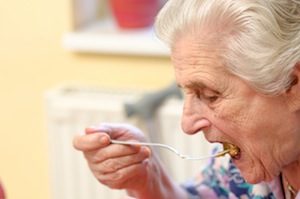Nursing Home Neglect: Malnutrition and Dehydration

That statistics surrounding nursing home malnutrition and dehydration are scary. When we put our elderly loved one in facility where they can receive the best care possible, we expect that they receive exactly that: the best care possible. So what is so hard about making sure that a patient, that is paying to be taken care of, get enough food and water to stay health and alive?
Nursing Home Malnutrition and Dehydration Statistics
- 35 to 85 percent of nursing home residents are malnourished
- 30 to 50 percent are underweight
Common Causes of Home Malnutrition and Dehydration
Common causes are inadequate food intake and repeated infections – the same primary causes of malnutrition in developing countries. Elderly malnutrition, when it comes down to the basics, is the fault of the nursing home staff. In most nursing homes, a single certified nursing assistant may be responsible for 10 or more resident everyday.
During mealtimes, this number may rise to 15 residents. Studies show that a nursing assistant should only be responsible 2 or 3 residents at a time.
This makes it clear how such a simple thing can be over looked.In addition to understaffing, nursing home staff inexperience may lead to elderly malnutrition. The field of certified nursing assistants experiences a 93 percent turnover rate each year. This excessive staff turnover rate can contribute to staff members making errors or lacking proper training.
Malnutrition and Dehydration are Serious, Silent Killers
Malnutrition and dehydration can lead to a host of medical complications, including infections, ulcers, cognitive degeneration, slow healing, joint and bone fractures, fatigue, depression, and increased mortality rate. The National Citizens’ Coalition for Nursing Home Reform calls the issue of malnutrition, weight loss and dehydration within the nursing home industry “one of the largest, silent epidemics in this country.”
The nursing home abuse attorneys at Abels & Annes, P.C. fight for the rights of families dealing with cases of nursing home abuse or neglect throughout Illinois. Often the decision to put a loved one into a nursing home or assisted-living facility is an emotional decision made possible by the belief that a professionally supervised environment is best for their welfare and physical well-being.
When it comes down to it, forcing an elderly patient to go without food or water for even one meal the same as medical negligence.
Basic nutrition should be the bare minimum of expected care. Yet malnutrition and dehydration are serious medical conditions inflicting far too many elderly nursing home residents and can lead to serious or fatal health complications.
Contact Abels & Annes, P.C. today for a Free Nursing Home Abuse Case Consultation. No Fee Unless You Win.
Common risk factors include depression, cognitive impairment, poor oral health and the side effects of medication. Nursing home environmental factors include lack of individual care, insufficient staffing levels, high turnover among staff members and poor food choices.
The Coalition for Nursing Home Reform has identified factors critical to a nursing home’s ability to ensure proper nutrition of residents, including: staffing levels at meal times; management and supervision of staff by licensed nurses; involvement of professionals, including doctors, dietitians, and dentists; and staff education.
The Nursing Home Reform Act of 1987 directly addresses the requirements for proper nutrition and hydration in nursing homes and applies directly to all of the nation’s 17,000 homes that participate in Medicare or Medicaid programs. The law mandates individual assessment and care planning, as well as sufficient staffing, physician oversight and other quality-of-life rights.
If you are dealing with the neglect or abuse of a loved one in an Illinois nursing home, contact the Chicago nursing home neglect lawyers at Abels & Annes, P.C. to discuss your rights. There are no fees unless you win.
If you believe your loved one is suffering from malnutrition or dehydration while in a nursing home in the Chicago, IL area, request a Free Case Consultation or Call (855) LAW-CHICAGO today to speak with a nursing home abuse and neglect lawyer.